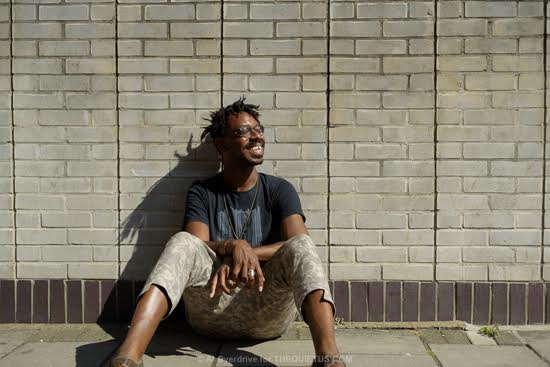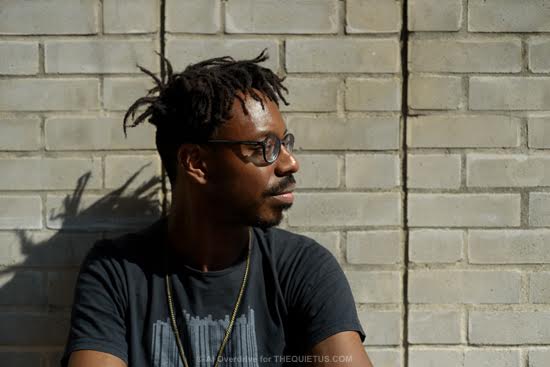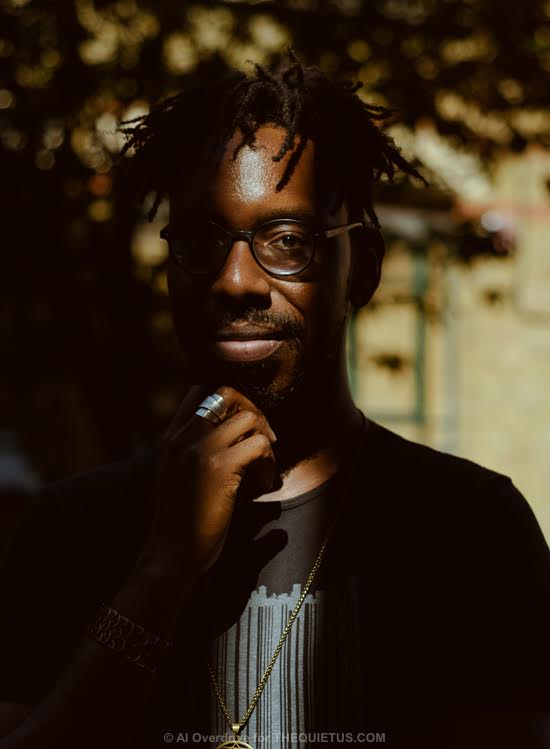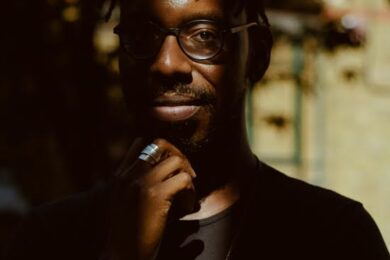Portraits courtesy of Mr Al Overdrive
Of the new generation of UK jazz musicians, Shabaka Hutchings is arguably the most energetic and adventurous, dissolving the barriers between the mainstream and avant-garde, and pushing the music into unexpected areas. Although jazz musicians have always appeared in different musical contexts, the sheer range of Hutchings’ activities is quite remarkable. At last week’s Mercury Prize ceremony he was burning through the ozone layer with his cosmic electro-jazz trio the Comet Is Coming. Over the summer, he’s been touring with jazzoid post-punk outfit Melt Yourself Down and his brilliant African-Caribbean influenced jazz group Sons of Kemet, not to mention beatmaker Floating Points.
In the past, he’s played free music with the likes of Steve Beresford, Orphy Robinson and Louis Moholo-Moholo, written chamber music for the Ligeti Quartet, and toured with Ethiopian jazz legend Mulatu Astatke as a member of the Heliocentrics. As befitting a musician with a keen interest in Afro-futurism, Hutchings is a regular guest with the Sun Ra Arkestra on their London visits, and recently recorded a session with acid-house outlier Hieroglyphic Being for online radio station NTS. For his latest project, Shabaka and the Ancestors, the 32-year-old saxophonist and clarinettist has teamed up with a crack squad of young South African jazzers. How does he get away with it?
"I feel that as a musician you get wrapped up in all these hypothetical minefields of whether what you’re doing is suitable or not, what context or genre or musical taste," he replies. "At the end of the day it’s like, whatever, play the music, and someone else will do the analysing. All the energy is put into playing the music. We’re not really thinking about the context, the grand scheme of what we’re doing, we’re just committing to what we’re doing at the time. The main thing is do we like it? Does it represent the sound that we’re trying to get across to the audience?"
As part of the Caribbean diaspora, Hutchings has a complex relationship with musical tradition. Born in London in 1984, he moved to Barbados at the age of six, where he started learning classical clarinet. At 16, he returned to the UK to continue his studies in Birmingham and then London. Although he would play classical music by day, at night he immersed himself in the London jazz scene, jamming with the likes of Soweto Kinch.
"There was no direct trauma in either of the moves, but in retrospect I can see how my life has taken shape around those events," Hutchings reflects. "I think one of them is a sense of non-allegiance to a certain region." Although he feels both English and Barbadian, he describes the Caribbean island as a sentimental homeland. "Barbados is the place I’ve grown up in and it’s added certain elements to the way I see music and what I decide to take from in terms of tradition. So yeah, maybe it’s affected my relationship with music in that there’s always a sense of searching from where I actually am from."

I ask Hutchings if he thinks that sense of non-allegiance has a bearing on his genre-hopping. "Possibly. I mean, I think I work in lots of different styles of music just ‘cos I like a lot of stuff. But maybe the way I’ve been able to do that in practical terms is [by] not having a fixed sense of what it is that I do, and maybe that comes from having to adapt. Like when I moved from England to Barbados, I was the English kid in Barbados. And throughout the course of that ten years, I assimilated what it was to be Barbadian and just at that point I guess where I was a Barbadian, I moved back to England, into an all boys grammar school, so then you’ve got to work out how to interact within that system. I guess all those events culminate in a sense of fluidity… and that’s what pays off in the music, not characterising yourself as one thing or another. And that’s how it’s been my whole playing career, thinking how do I fit in without changing what I do to a point where I can’t recognise what I’m saying?"
Although Hutchings’ characteristic Afro-Caribbean melodicism radiates throughout the Ancestor’s debut album Wisdom Of Elders, their music sits more comfortably within the jazz tradition than some of his other projects. "I like that," he smiles. "You’ve really got that sense of it wasn’t trying to be not-jazz. Not that we try to be not-jazz [in the UK] but I think jazz has got a certain stigma attached to it. There’s a history of jazz here that’s maybe gone a bit stale for our liking. The generation that I’m in are trying to push it out a bit and see what different influences we can combine with that music to make it more in line with what we actually enjoy when we just listen to music or when we go out. Whereas [in South Africa] it’s like those guys just really enjoy jazz. They enjoy lots of other types of music, but there’s no sense of, ‘We wanna push away from that thing.’"
Offering an original take on the culture of Black Atlantic, Wisdom Of Elders is a glorious communion of spiritual jazz, Caribbean music and fiery Johannesburg jazz. Hutchings is a marvel throughout, his tenor a conduit for gorgeous melodies, hot rhythmic vamps and tightly coiled ecstasies. His interplay with drummer Tumi Mogorosi gives the album its particular energy, with the saxophonist deftly negotiating the tension between freedom and form. Mlangeni is another stand-out, cutting through Nduduzo Makhathini’s impressionistic Rhodes colouring with sharp, silver beams. The rest of the group – singer Siyabonga Mthembu, bassist Ariel Zamonsky, altoist Mthunzi Mvubu and percussionist Gonste Makhene – are equally impressive, bringing their distinctive voices into a unified whole.
Hutchings’ introduction to the contemporary South African scene came about through his former partner, who lived in Cape Town. "I started going there about three years ago. Every time I went I’d play with musicians," he recalls. His first point of contact was Mlangeni, leader of the wild Capetown collective Tune Recreation Committee and the Johannesburg based Amandla Freedom Ensemble. "The musicians that really sparked me off were based in Johannesburg," says Hutchings. "It’s a different kind of atmosphere they have in Johannesburg. It’s a bit more edgy in that there’s just no picturesqueness. You hear that in the music."
The idea behind the album, he explains, was to present his musical language in a new context. "I decided I just wanted to take some music that I’d probably associate with my bands in the UK, and see what happened when [the South Africans] played it. They’re new tunes, but then because they’re completely different types of players it sounds nothing like what I do over here. I come to it, like, taking South African players that have a canon of their own, I find when you give them music that’s slightly off kilter from that, you actually create something that taps into their less overt influences, and my less overt influences."
The exception is the album’s atmospheric closing track ‘Nguni’, which draws on the semi-improvisational call and response structure of the traditional music of the Nguni people. Nonetheless, Hutchings was keen not to make the album sound like his "take" on South African music. "To me, those guys are South African, so whatever they play will be South African music. I don’t need to hit people over the head with the South African stick."

In contrast to The Comet Is Coming’s motorik drive and Sons Of Kemet’s polyrhytmic grooves, The Ancestors have a much freer relationship with time. "I guess that the way Tumi plays is directly influenced by Louis Moholo in that both of them use the pulse of the music and they’re very in tune to where the music is going on an energy level. They use groove as a way of embellishing non-conventional drum language, as opposed to vice versa."
On the climactic duo exchange ‘Give Thanks’, it’s Hutchings who tends to anchor the music while Mogorosi runs free. "Yeah, I had to learn to play with Tumi," he grins. "I enjoyed his playing from the moment I heard him and I thought he was one of my favourite drummers. But it’s that weird thing where he’s really with you on an energy level and real intuitive level but he’s not holding the rhythm down for you at all, so sometimes you’ve got to be the person that’s providing that function. So I see myself, when I’m playing with a drummer like him, or in this group in general, as a part of the rhythm, not a soloist that floats on the top of it."
The name of the group came from a conversation Hutchings heard in South Africa shortly before recording the album. "A guy was talking about the fact that the ancestors are always around us," he recalls. "I find it interesting because there’s not that much talk about the concept of ancestors in England. It’s interesting, coming from the Caribbean, where unless you’ve done that DNA test or traced your roots back to Africa, ancestry stops at like four generations back, maybe more, maybe less. So obviously there’s not that access in terms of ancestry, in that sense, for me." Instead, Hutchings came to think of ancestry in terms of music, specifically the process by which elder players pass their wisdom on to the next generation, who then interpret that information in their own way.
As with all his main projects, the Ancestors developed organically out of his relationship with other musicians, rather than some grand conceptual plan. The Comet Is Coming, for example, grew out of Hutchings’ love of synth and drums duo Soccer 96. "I heard them at a thing in Camden," he recalls. "I said, ‘That was amazing. Can I play on one song?’ – I had my sax – and they were like, ‘Yeah, cool.’ So I jumped in and played and it went off." These guest spots would become a regular occurrence. Eventually, Hutchings, synth player Dan Leavers and drummer Max Hallett decided to book some studio time and let the muse take them.
"We just pressed record and started jamming, like totally formed tunes, reels of them, it was really strange. I don’t know how we did it, but we were thinking we were all on the same page, we like the same things." After four days, Hutchings, synth player Dan Leavers and drummer Max Hallett had enough material for an album and an EP. Realising this was a project in its own right, they became the Comet Is Coming, renaming themselves King Shabaka, Danalogue the Conqueror and Betamax Killer.
While Hutchings was flattered by the group’s Mercury nomination, his focus, as ever, is on the future. In between touring with his own groups, he plans to spend more time in the USA next year, investigating local scenes and following the Sun Ra Arkestra around. "I play with them when they’re in Europe, but I actually want to play with them when they’re in the place that they’re from," he explains. In New York, he hopes to rekindle his BBC instigated trio with bassist Chris Morrissey and drummer Mark Guiliana, the man behind the astonishing Art-Blakey-plays-Squarepusher rhythms of David Bowie’s Blackstar.
A recent NTS radio session with Chicago house outlier Hieroglyphic Being and percussionist Sarathy Korwar has given him further inspiration. "That’s the kind of direction that I want the next Sons Of Kemet album to go in," he declares. Although Kemet deploy subtle dub effects on their albums, their sound is essentially acoustic, with Tom Skinner and Seb Rochford entering a drum dialogue that taps into contemporary bass music via Rastafarian nyanbinghi drums, Barbadian tuk and West African drum circles. Theon Cross’s tuba, meanwhile, sounds like a free jazz loving hippo making grime instrumentals. By citing producers like Hieroglyphic Being, Hutchings isn’t thinking in terms of "going electronic" but rather exploring extended musical forms.
"I’m not good at definitions in terms of electronic music, but slowly moving music that has loads of flow. It still gets to the same level of hype, but instead of it being a three minute song, we can see the development over 20 minutes, where you can’t necessarily tell when things come in. Actress does that a lot. By the end it’s like a different track to what it was like at the beginning, but there’s no specific point when something kicked off. It’s slowly added to.
Ideally I’d like an album that’s like one of those Pharoah Sanders records where there’s only three tracks and each of the tracks is like 20 minutes, so you can really get a sense of the band really going into the music."
Wisdom Of Elders is out now on Brownswood




